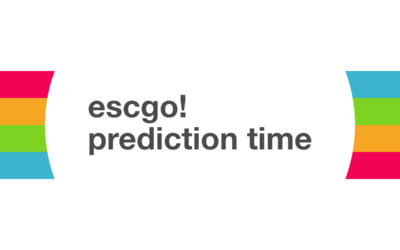
Five more times the Eurovision host country went local

Five more times the Eurovision host country went local
Winning the Eurovision Song Contest is great. Not only do you get to host the event the next year, but the pressure is off when it comes to getting a decent result. You can sit back and bask in the reflected glory of your recent win – and as a broadcaster, you may even want to actively avoid the cost and effort of organising the event two years in succession.
Even better, being automatically qualified for the grand final gives you the opportunity to take a few risks and show a bit of local colour, safe in the knowledge that you’ll be enjoying the adulation of the Saturday night crowd no matter what. The host country of ESC 2018, Portugal, could be viewed as taking precisely this approach. Of course, no one is suggesting that RTP is going out of its way to score badly, but the home entry “O jardim” is a brave and atypical package that would have some real question marks hanging over it if it needed to battle its way out of a semi-final. Instead, this very Portuguese song will take pride of place in the final line-up, filling a niche that would otherwise remain unfilled.
But 2018 is far from the only time the host broadcaster has seized the moment and given us a more unusual home entry with some local flavour. Join us as we explore five of the more interesting home entries from years gone by…
GreenJolly – Razom nas bahato (Ukraine 2005)
It was meant to be Ani Lorak’s year. But when you schedule a national selection with fifteen (!) weekly semi-finals, you run the risk that circumstances might change in the meantime. Even then, the Orange Revolution represented a pretty major change in circumstances, and one which prompted Ukrainian broadcaster NTU (with just a hint of external pressure) to parachute four additional wildcard entries into its grand final in late February. Among them was “Razom nas bahato” (“Together we are many”), a hip-hop song that just happened to have been one of the unofficial anthems of the revolution. To no one’s surprise, it duly won the ticket to ESC proper. The lyrics had to be tweaked in order to satisfy the EBU’s “no political content” rule, but this particular home entry couldn’t have been more local if it tried – everyone knew what it was really saying (and indeed what it originally had said), and to complain that it ultimately received very little love from the voters in rest of Europe would be to miss the point. As for Ani Lorak, she would get her revenge three years later – and very nearly cause NTU to have to find another home entry.
Furbaz – Viver senza tei (Switzerland 1989)
In the days when you had to sing in your native language at Eurovision, Switzerland had something of an in-built advantage. The alpine nation had no fewer than four languages at its disposal, and while almost all of their biggest successes (including their two victories in the competition) came when singing in French, they also deployed German and Italian on many occasions. But what about Romansh? Although spoken as a first language by very few Swiss citizens – estimates range from 35,000 to 60,000 depending on who you ask – the Rhaeto-Romance language enjoys official status in Switzerland alongside French, German and Italian, and yet it had never been seen on the Eurovision stage until the contest was hosted in Lausanne in 1989. Furbaz, a quartet led by pianist and singer Marie Louise Werth, had already entered the previous two Swiss national finals, finishing third and second. Perhaps this trajectory meant they would have won in 1989 anyway, or perhaps a desire to show off the minority language on home soil pushed them over the line. Either way, “Viver senza tei” (“To live without you”) remains the only time Romansh has had its moment in the Eurovision limelight – and, with English now the lingua franca of the competition, that seems likely to remain the case.
Roger Pontare – When Spirits Are Calling My Name (Sweden 2000)
On the surface, Sweden’s home entry from 2000 was a fairly standard schlager stomper with a barely concealed desire to be a Meat Loaf album track. Sometimes things can get lost in translation, though. The English lyric alludes to the song’s theme with lines like “let me be the native son with freedom in my heart”, but the Swedish original made it much clearer that this was all about indigenous people fighting to defend their traditions, their cultures and their territories (“I see the axe in the hand of the warrior… I’ll never let down my land when the winds are whispering my name”). Almost immediately after winning Melodifestivalen, the song was hailed by populist political party Sverigedemokraterna and other right-wing groups as a coded call to defend Sweden itself against outside threats – something fiercely denied by Pontare and songwriter Peter Dahl, needless to say. Like at Melodifestivalen, Roger Pontare wore a Sami outfit on stage at ESC in Globen – he himself comes from Sweden’s Lappland province – while his backing group included Cree, Inuit and Norwegian Sami representatives. All of this helped to drive home the message of minority empowerment and wave away any residual whiff of nationalism, leaving Sweden to place comfortably inside the top 10 on home soil – aided by one of ESC’s first demonstrations of seriously heavy pyrotechnics.
Peppino di Capri – Comme è ddoce ‘o mare (Italy 1991)
Italy long had an indifferent attitude towards the Eurovision Song Contest, and nowhere was this better reflected than in their hosting of the 1991 event following Toto Cutugno’s victory in Zagreb the previous year. Firstly, the venue was changed at short notice from the classic concert hall in Sanremo to a studio at the Cinecittà film complex in Rome, ostensibly due to security concerns surrounding the Gulf War; in any case, the result was a shabby-looking hall and a stage full of random design elements. Secondly, the hosting job was given to Cutugno himself and fellow winner Gigliola Cinquetti, neither of whom possessed a particularly strong grasp of the English language or the concepts of order and calm. Add an orchestra with a misfiring saxophonist and a voting sequence that ended in a dead heat, and it’s no wonder that EBU scrutineer Frank Naef was reportedly very vocal in his relief at the dull but competent arrangement of the contest in Malmö the next year. The calm in the eye of the Italian storm, however, was provided by the home entry. Veteran singer Peppino di Capri performed “Comme è ddoce ‘o mare” (“How sweet is the sea”) effortlessly and with an engaging kind of anti-charisma, while the Neapolitan language combined with lush orchestration to evoke the titular coastline and the sensation of weightless love. The local flavour of the entry and its last place in the running order almost made it feel like an interval act. Handily, this also allows us to block out the memory of the actual interval act, which may be for the best.
Jelena Tomašević – Oro (Serbia 2008)
Vidovdan or St. Vitus Day is a national and religious holiday in Serbia, commemorating the martyrs who fell during the Battle of Kosovo in 1389. It also plays a central role in the lyrics to “Oro”, the entry that represented Serbia on home soil following Marija Šerifović’s win in Helsinki in 2007. Ostensibly a lament for a missing lover couched in the language of a lilting lullaby, you don’t need a literature degree to read between the lines: Jelena’s fella has been massacred by those evil mediaeval Turks and she’s not too thrilled about it. Context is everything with an entry like this – so let it be noted that Kosovo unilaterally declared independence from Serbia on 17 February 2008, an action that was (and remains) vehemently rejected by Serbia and that even precipitated the fall of the country’s coalition government the following month. Less importantly, but more relevantly to the case in hand, the Serbian preselection Beovizija was delayed by several weeks as a result of the turmoil – and so, on 10 March, a song with fairly unambiguous allusions to the Battle of Kosovo won the right to represent Serbia as the home entry at that year’s Eurovision Song Contest in May, where it would finish in a thoroughly respectable 6th place. And some people think ESC is a light entertainment show…
Visit our Eurovision Chat!
0 Comments
Visit our Eurovision Chat!
Follow us:
Who will win the Eurovision Song Contest 2024? Our prediction for the final
Happy Eurovision – the big day has arrived! Tonight the grand final of ESC 2024 will be held in Malmö, Sweden. But who will hold the trophy at the end of the show? It’s time for our team’s predictions!
The View from Israel: Unforgettable
There’s one more night left for Eurovision 2024, and Shi is hoping we can all enjoy it a little.
Overthinking the 2024 grand final running order
As the dust settles on the second semi-final, Martin takes a look at what the producers have come up with for the ESC 2024 grand final running order and what – if anything – it might mean…
ESC 2024: The escgo! predictions for tonight’s semi-final 2
Let the team predictions continue! These are the songs that Felix, Shi and Martin think will qualify from tonight’s second semi-final of the 2024 Eurovision Song Contest.
The View from Israel: We rum-de-dum-dum-da
The View is back for Eurovision 2024! Different location, same overthinking – and now it’s time for the second semi-final.
ESC 2024: The escgo! predictions for tonight’s semi-final 1
It wouldn’t be Eurovision without some predictions from our team! These are the songs that Felix, Shi and Martin think will qualify from tonight’s first semi-final.
The View from Israel: Whеn the stars align then I’ll be thеre
The View is back for Eurovision 2024! Different location, same overthinking – starting with the first semi-final!
Gåte from Norway are the winners of ChatVote 2024!
The 20th annual edition of ChatVote is over, and the best song in the forthcoming Eurovision Song Contest is the one from…
ChatVote 2024 is launched! Once again: One Night. One Winner.
It’s time for the 20th edition of our legendary annual event. For our chat regulars, the lines are now open for you to submit your votes!
“Naiv” by Marie Reim is the winner of SongHunt 2024!
Our chat community and the public have decided: “Naiv” by Marie Reim from Germany is the most ROBBED song of the 2024 Eurovision national final season!
Who will win the Eurovision Song Contest 2024? Our prediction for the final
Happy Eurovision – the big day has arrived! Tonight the grand final of ESC 2024 will be held in Malmö, Sweden. But who will hold the trophy at the end of the show? It’s time for our team’s predictions!
The View from Israel: Unforgettable
There’s one more night left for Eurovision 2024, and Shi is hoping we can all enjoy it a little.
Overthinking the 2024 grand final running order
As the dust settles on the second semi-final, Martin takes a look at what the producers have come up with for the ESC 2024 grand final running order and what – if anything – it might mean…
ESC 2024: The escgo! predictions for tonight’s semi-final 2
Let the team predictions continue! These are the songs that Felix, Shi and Martin think will qualify from tonight’s second semi-final of the 2024 Eurovision Song Contest.
escgo! on Twitter










0 Comments